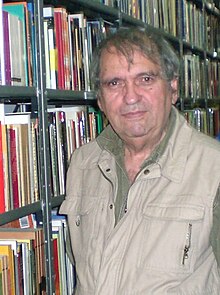Rafael Cadenas
Appearance
Rafael Cadenas | |
|---|---|
 | |
| Signature | |
Rafael Cadenas (born 8 April 1930 Barquisimeto, Lara) is a Venezuelan poet and essayist.[1][2] He taught for many years at the Central University of Venezuela.[3]. He received the National Prize for Literature (1985), Guadalajara's International Book Fair prize of literature (Romance languages) (México, 2009) and García Lorca Prize (2015).
His most famous poem is "Derrota".
Awards
- Conac's essay prize (1984).
- National Prize for Literature (Poetry)(Venezuela, 1985).
- Juan Antonio Pérez Bonalde's International Prize of Poetry (1992).
- Guggenheim Fellowship (1986).
- Honorary degree from the University of the Andes, Venezuela (2001).
- Honorary degree from the Central University of Venezuela (2005).
- Guadalajara's International Book Fair prize of literature (Romance languages) (México, 2009)
- García Lorca Prize (2015)
- Reina Sofia (2018)
Works
Poetry
- Cantos iniciales (1946)
- Una isla (1958)
- Los cuadernos del destierro (1960, 2001)
- "Derrota" (1963)
- Falsas maniobras (1966)
- Tiempo Del Machete (1969)
- Intemperie (1977)
- Memorial (1977) Bilingual Edition (Spanish to English)
- Amante (1983)
- Dichos (1992)
- Gestiones (1992)
- Antología (1958–1993) (1996), (1999)
- Amante (bid & co. editor, 2002)
- Poemas selectos (bid & co. editor, 2004, 2006, 2009)
- Amant (bid & co. editor, 2004) [trad. al francés de "Amante")
- Lover (bid & co. editor, 2004, 2009)
- El taller de al lado (bid & co. editor, 2005)
- Sobre abierto (2012)
Essays
- Literatura y vida (1972)
- Realidad y literatura (1979)
- Apuntes sobre San Juan de la Cruz y la mística (1977, 1995)
- La barbarie civilizada (1981)
- Anotaciones (1983)
- Reflexiones sobre la ciudad moderna (1983)
- En torno al lenguaje (1984)
- Sobre la enseñanza de la literatura en la Educación Media (1998)
References
External links
- Author's website
- "Rafael Cadenas: “Nunca he sabido lo que es un poema”", Harry Almela, 8.31.2008
- "Contra la barbarie de la propia estimación: Entrevista con Rafael Cadenas", Claudia Posadas
